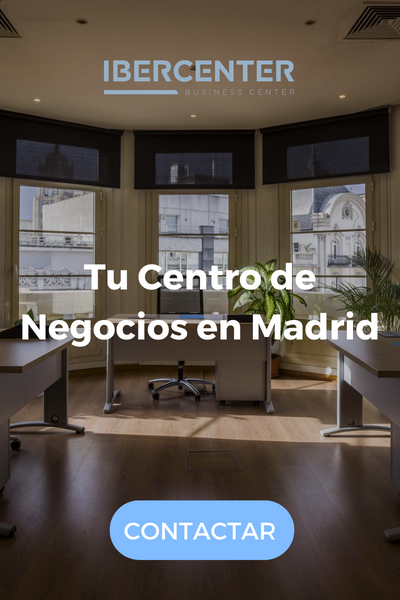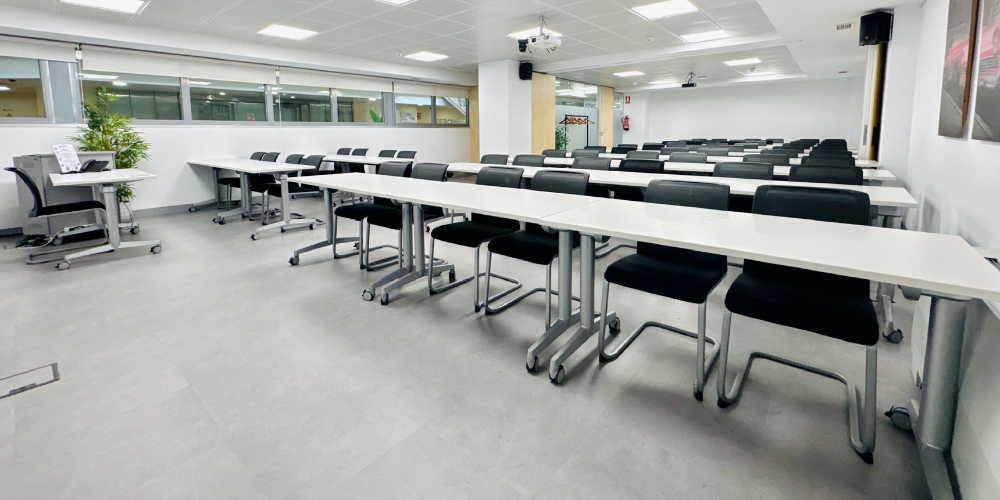Preparing for a job interview is not only essential to convey confidence and professionalism but also reflects your interest in and commitment to the job you are applying for. In a competitive job market, every detail counts, and preparation can be your greatest ally to stand out from other candidates.
From our experience in renting rooms in Madrid for job interviews, we have observed how good pre-planning can transform the dynamics of an interview. When companies are looking for the best talent, they expect candidates who not only have the necessary skills but also know how to demonstrate their ability to adapt to the company’s values and objectives. Proper preparation will allow you not only to answer questions well, but also to convey your enthusiasm and fit in perfectly with the working environment on offer.
Preparation is key because it gives you the opportunity to anticipate challenges. By knowing in advance, the information about the company, the position and the possible topics to be addressed, you can structure your answers and avoid improvisations that could lead to mistakes. It will also help you control your nerves, project confidence and handle unforeseen situations with greater ease. Interviewers greatly value those who demonstrate that they have done their homework, as this denotes professionalism and a genuine interest in being part of their team.
So don’t underestimate the importance of this step. Preparing for a job interview is an investment in yourself and your future career. If you take the time to study, practice and plan, you will arrive on the day of the interview with a decisive advantage, ready to show your best self and take that key step in your career.

Research the company and the position
Researching the company and the position you are applying for beforehand is essential. This step will not only allow you to respond more confidently during the interview but will also give you the tools to demonstrate that you understand the environment in which you would like to work and that you have taken the selection process seriously.
Before you sit down in front of the interviewer, it is essential that you research the company thoroughly. Knowing their mission, vision and values is not just a matter of professional courtesy, but a way of understanding whether you fit in with their corporate culture. When a company defines its purpose and objectives, it does so with the intention of attracting candidates who share its philosophy. Showing that you understand those principles and that you are aligned with them will work in your favour during the interview.
It’s not just a matter of repeating phrases you find on their website, but of analysing how your experience and skills can contribute to achieving their goals. If, for example, the company prioritises innovation or customer service, it is key that you prepare concrete examples from your career that reflect these qualities. This not only demonstrates your interest, but also your ability to adapt to their expectations.
In addition to researching the company, it is essential that you delve into the details of the position for which you are applying. Read the job description carefully and think about the skills and competencies they are looking for. Think about how you can stand out with your strengths and be prepared to explain how your previous experience makes you the ideal candidate for the role. Identifying the specific needs of the role and being prepared to address them will allow you to provide clear and focused answers that will impress the interviewer.
If you know the name of the person interviewing you, taking the time to research their profile can make a difference. On platforms such as LinkedIn, you can find out about their background, current roles and professional interests. While you don’t need to mention this research directly, having context about who is on the other side of the table can help you personalise your answers and make a better connection.
Preparing in this way will give you confidence and show that you are not only interested in getting the job, but that you are willing to put in the effort and attention to be part of that organisation. This approach is one of the keys to successfully answering the question: How do you prepare for a job interview?
Prepare your answers
While every interview has unique nuances, many questions are often repeated, and being ready to answer them with confidence can make the difference between a good impression and a missed opportunity. The key is clarity, honesty and the ability to connect your answers to the needs of the job.
Some of the most common job interview questions include topics such as your strengths and weaknesses, your most relevant achievements, why you are interested in the position or where you see yourself in the future. These questions may seem simple, but behind them interviewers are looking to assess both your experience and your thinking.
For example, if you are asked about your strengths, it is not enough to mention generic qualities such as “I am hardworking” or “I adapt quickly”. Instead, give concrete examples of how these strengths have helped you achieve positive results in your career.
When it comes to talk about your weaknesses, it is normal to feel a little awkward, but the important thing is to approach this question with honesty and perspective. A useful strategy is to mention a real weakness that is not critical to the position but shows your willingness to improve. For example, you might say: “I used to have difficulty delegating tasks because I liked to control all the details, but over time I have learned to trust my team and have found that this improves overall results. This approach demonstrates self-awareness and proactivity, two qualities that employers value highly.
On the other hand, highlighting your professional achievements is an excellent opportunity to shine in the interview. Be prepared to talk about specific instances where you have exceeded expectations, solved problems or achieved important goals. Use specifics whenever possible. For example, instead of saying “I increased sales at my last job”, a more impactful answer would be: “At my last job I was able to increase sales by 20% in six months by implementing a new customer acquisition strategy”. Numbers and clear examples make your achievements tangible and easy for the interviewer to appreciate.
Preparing these answers in advance does not mean memorising them word for word but having a clear structure in mind that allows you to adapt them to the conversation. This will help you to respond fluently and confidently, showing your ability to communicate in an effective and structured way. In short, knowing how to prepare for a job interview is not just a matter of research or practice, but of showing the best version of yourself through answers that connect your skills and experience with the needs of the job.
Pre-interview practice
Pre-interview practice is one of the best strategies for a successful job interview. The idea is simple: the more comfortable and confident you feel answering questions, the better you will be at the actual interview. Preparing not only involves studying the company or the position but also training your ability to communicate effectively. This process will help you refine your answers, polish your body language and convey confidence.
One effective way to practice is to conduct mock interviews with a friend, colleague or mentor. It is important that this person is someone who can give you honest and constructive feedback. Provide your interview partner with a list of typical questions so that they can recreate a realistic interview. These simulations will not only allow you to improve your answers, but also to get used to the rhythm and dynamics of a professional conversation. Listen carefully to feedback and adjust your approach as necessary.
If you don’t have someone available to practice with, there are online tools that can help. Platforms such as mock video interviews or specialised apps allow you to answer frequently asked questions and receive automatic feedback on aspects such as the clarity of your answers or your body language. These tools are ideal for identifying areas for improvement and becoming more fluent in your answers. You can also record yourself while you are rehearsing, which will allow you to analyse how you are expressing yourself, correcting your crutches and adjusting your tone of voice so that you sound natural and confident.
Another key aspect is to work on your verbal communication. Speaking in a clear and structured way takes practice, but it is essential to get your ideas across accurately. A good tip is to use the STAR (Situation, Task, Action, Result) technique to answer questions related to your achievements or work experience. This structure helps you to be concise and direct, avoiding rambling or going blank. It is also important to pay attention to the speed at which you speak; a calm, leisurely pace builds confidence in the interviewer and allows you to think better before answering.
Practising beforehand will give you the confidence to deal with any situation that may arise during the interview. This kind of preparation shows that you are committed to the process and will allow you to project a professional image that can set you apart from other candidates.
Prepare your questions for the interviewer
Asking the interviewer questions is one of the best ways to show genuine interest and stand out during a job interview. Many people underestimate this part of the process but preparing relevant and thoughtful questions can make all the difference. Showing curiosity about the job, the company and its values not only helps project a professional image but also provides key information to determine if this is the right opportunity for you.
The importance of asking questions is that interviews should not be a monologue from the interviewer, but a conversation in which both parties assess whether there is a mutual fit. By asking questions, you convey that you have researched the company and that you are interested in better understanding its operations and expectations. In addition, well-phrased questions can give clues about your preparation and strategic mindset, which is highly valued by interviewers.
It is advisable to prepare in advance intelligent and relevant questions that go beyond the basic information available on the company’s website. For example, you could ask: “What are the most important challenges this position will face in the first six months”, or “How would you define success in this role? These questions not only show that you are thinking about how you could add value from day one but also give you a clearer picture of expectations. Another good approach is to ask about company culture or growth opportunities: “How would you describe the dynamics of the team you would work in?” or “Are there internal programmes for professional development? These types of questions reflect both short- and long-term interest, which is always positive.
However, it is also important to know which questions to avoid. Asking questions like “What does this company do?” or “Can I change my work schedule?” can give the impression that you haven’t taken the time to research or that you are not committed to the job requirements. It is also not advisable to focus too much on salary or benefits before the interviewer brings up the subject, as it may appear that your only interest is financial. The key is to maintain balance and ensure that your questions add value to the conversation.
Preparing questions for the interviewer not only demonstrates professionalism but also allows you to obtain essential information to make an informed decision if you are eventually offered the job. This step is a fundamental part of preparing for a job interview, and spending time on it can help you stand out as a thoughtful and well-prepared candidate.
Final tips for the day of the interview
The day of the interview is undoubtedly one of the most important moments in the job search process. Everything you have prepared beforehand comes to a head, and it is natural to feel a little nervous. Knowing how to prepare for a job interview includes not only what you do beforehand, but also how you manage that crucial moment when you come face to face with the interviewer.
To calm your nerves before you enter the room, it is essential to remember that you are prepared. You’ve researched the company, rehearsed your answers and made sure you’ve taken care of practical details such as arriving on time and dressing appropriately. Take a few minutes before the interview to take a deep breath, relax and visualise how you want the conversation to go. A simple but effective trick is to focus your mind on the present and mentally repeat that you are ready for the challenge. This type of exercise not only reduces anxiety, but also helps you project a calm attitude right from the start.
During the interview, maintaining a positive and proactive attitude is essential. Greet the interviewer with a smile, a firm handshake and eye contact. These small actions communicate confidence and professionalism. Listen carefully to each question before answering and don’t be afraid to take a moment to structure your thoughts if you need to. Avoid overly brief or generic answers, but don’t ramble either.
Ideally, each answer should connect with the needs of the job and highlight your skills clearly and concisely. It is also important that you show enthusiasm. If the conversation allows, don’t hesitate to share what motivates you about the role or what you admire about the company, always from an authentic and well-grounded perspective.
When it’s time to end the interview, it’s important to close with a good impression. If you have not done so before, take the opportunity to ask the questions you have prepared, showing interest in the position and the organisation. Thank the interviewer for their time and the opportunity to participate in the process. A detail that does not go unnoticed is to say goodbye with a positive attitude, making it clear that you are available for any additional information they may need. Something as simple as “I look forward to the opportunity to work with you” can set a friendly and professional final tone.
Knowing how to prepare for a job interview involves taking care of every detail, from the first impression to the closing. Managing your nerves, maintaining a positive attitude and finishing with grace will help you stand out as a strong and prepared candidate, leaving a positive impression on the interviewer.
Conclusion
Knowing how to prepare for a job interview is essential to increase your chances of success in your job search. Preparation starts long before the day of the interview and involves several key steps that cannot be overlooked. From thoroughly researching the company and the position, to practising your answers and preparing smart questions for the interviewer, every detail counts. And the day of the interview is just as crucial: staying calm, projecting a positive attitude and closing with a good impression can set you apart from other candidates.
Preparation not only helps you feel more confident but also shows your commitment and professionalism. When a candidate arrives well-informed, with structured answers and a genuine interest in the company, it conveys an image that interviewers value highly. In a competitive job market, the small details can be the deciding factor, and being prepared is one of the best investments you can make in your career.
At Ibercenter, as a coworking centre in Madrid, we witness how companies and candidates strive for successful interviews. We provide spaces designed to create the perfect environment for meetings and interviews, making it easier for professionals to focus on what really matters: highlighting their talent and skills. Our goal has always been to provide an environment that drives business and entrepreneurial success, and we understand the importance of being well prepared in all aspects of the world of work.
Preparing for a job interview is not just another task in the job search process. It is an opportunity to show the best version of yourself and connect with an organisation that could be key to your future. Spend time on each step and trust that the effort will pay off. In the end, preparation not only improves your performance in the interview, but also boosts your confidence and puts you one step closer to achieving your career goals.




